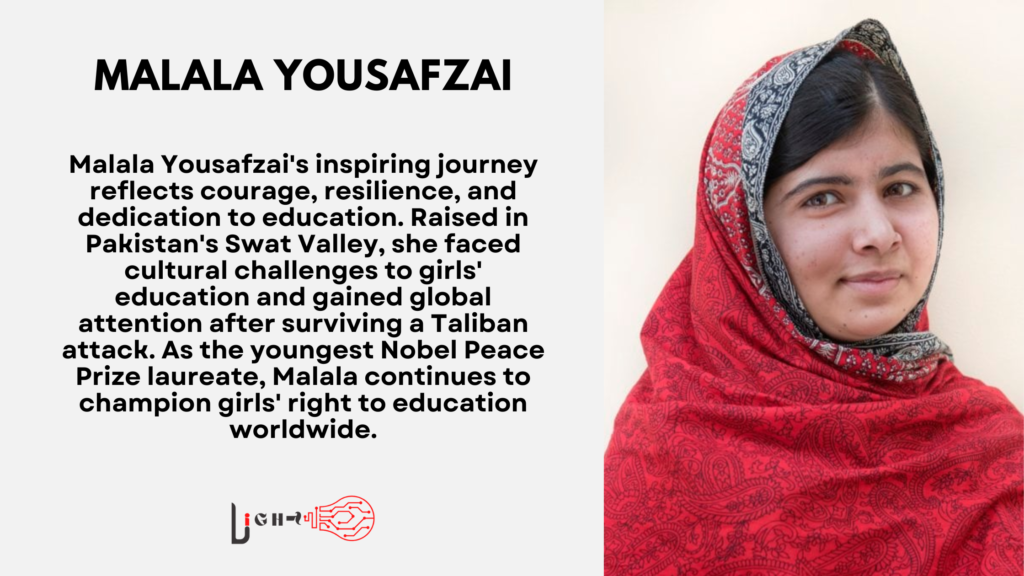Malala Yousafzai’s story is one of bravery, resilience, and an unwavering commitment to education. Born in Pakistan’s Swat Valley, she grew up amidst cultural barriers to girls’ education. Her advocacy for education began at a young age, sparking worldwide recognition after a near-fatal attack by the Taliban.
Since then, Malala has continued to fight for girls’ rights, becoming the youngest recipient of the Nobel Peace Prize. This blog explores her journey, accomplishments, and ongoing efforts to ensure that every girl has the right to learn.
Early Life and Background
Malala’s Childhood in Pakistan
Growing up in a region where girls’ education was often discouraged, Malala’s early years were shaped by her father’s educational advocacy. Ziauddin Yousafzai, her father, ran a local school and championed the right to education, inspiring Malala from an early age.
Despite the rising Taliban influence, which targeted schools and forbade girls from attending, Malala remained determined. She became a voice for education, blogging for the BBC Urdu under a pseudonym at the age of 11.Her writings detailed the struggles girls faced in accessing education, gaining international attention.
The Attack that Changed Everything
The Shooting and Its Impact on Malala
In 2012, Malala was shot in the head by a Taliban gunman while on her way home from school.
The attack was intended to silence her advocacy but had the opposite effect, galvanizing global support for her cause. After surviving the attack, Malala was airlifted to the UK for extensive medical treatment. The incident brought international condemnation of the Taliban’s actions and highlighted the urgent need for educational rights. Malala’s recovery and return to activism inspired millions, marking a turning point in her life and mission.
Harrison Hagan Schmitt: From Earth to the Moon
To know more click here:https://light.vintbit.com/general-knowledge/harrison-hagan-schmitt/
Advocacy for Girls’ Education
Malala’s Campaigns and Initiatives
Malala has tirelessly advocated for education, emphasizing that every child deserves access to learning opportunities. She co-founded the Malala Fund, a non-profit organization aimed at increasing girls’ access to education worldwide. Through the Fund, she has supported projects in countries like Nigeria, Pakistan, and Syria, addressing barriers to girls’ education.
Her advocacy also extends to speaking engagements at the United Nations and discussions with global leaders. Malala continues to emphasize that investing in education is key to economic development and societal progress.
Awards and Honors Received
In 2014, Malala became the youngest recipient of the Nobel Peace Prize, sharing it with Indian activist Kailash Satyarthi.The award recognized her struggle against the suppression of children and for the right to education.Malala has also received numerous other honors, including honorary Canadian citizenship and the Liberty Medal.Her recognition has helped amplify her message, motivating others to advocate for educational equality.Despite her accolades, Malala remains focused on the cause rather than the recognition, prioritizing action over awards.
Future Goals
Malala’s work is far from over; she continues to advocate for girls’ education through various initiatives.The Malala Fund supports education projects in over 10 countries, with an emphasis on local solutions.She also campaigns for policy changes to remove educational barriers and increase funding for schools.Malala’s legacy is built not only on her courage but also on the impact she has made on countless lives.Her future goals include seeing every girl in school and ensuring that education is a right, not a privilege.
Conclusion
Malala Yousafzai’s journey from a small town in Pakistan to the global stage is a testament to the power of one voice.Her story inspires action, reminding the world that education is a fundamental right for all.As she continues to advocate for girls’ rights, Malala’s legacy grows, offering hope and opportunities to future generations.Her work is a powerful reminder that even in the face of adversity, change is possible when one stands up for what is right.

